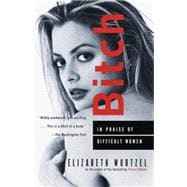Bitch is a tract on the history of manipulative female behavior. By looking at women who derive their power from their sexuality, Wurtzel offers a trenchant cultural critique of contemporary gender relations. Beginning with Delilah, the first woman to supposedly bring a great man down (latter-day Delilahs include Yoko Ono, Pam Smart, Bess Myerson), Wurtzel finds many biblical counterparts to the men and women in today's headlines. In five extended essays, she links the lives of women as demanding and disparate as Amy Fisher, Hillary Clinton, Margaux Hemingway, and Nicole Brown Simpson. Wurtzel gives voice to those women whose lives have been misunderstood, who have been dismissed for their beauty, their madness, their youth. She finds in the story of Amy Fisher the tragic plight of all Lolitas, our thirst for their brief and intense flame. She connects Hemingway's tragic suicide to those of Sylvia Plath, Edie Sedgwick, and Marilyn Monroe, women whose beauty was an end, ultimately, in itself. Wurtzel, writing about the wife/mistress dichotomy, explains how some women are anointed as wife material, while others are relegated to the role of mistress. She takes to task the double standard imposed on women, the cultural insistence on goodness and society's complete obsession with badness: what's a girl to do?
Bitch tells a tale both celebratory and cautionary as Wurtzel catalogs some of the most infamous women in history, defending their outsize desires, describing their exquisite loneliness, championing their take-no-prisoners approach to life and to love.








